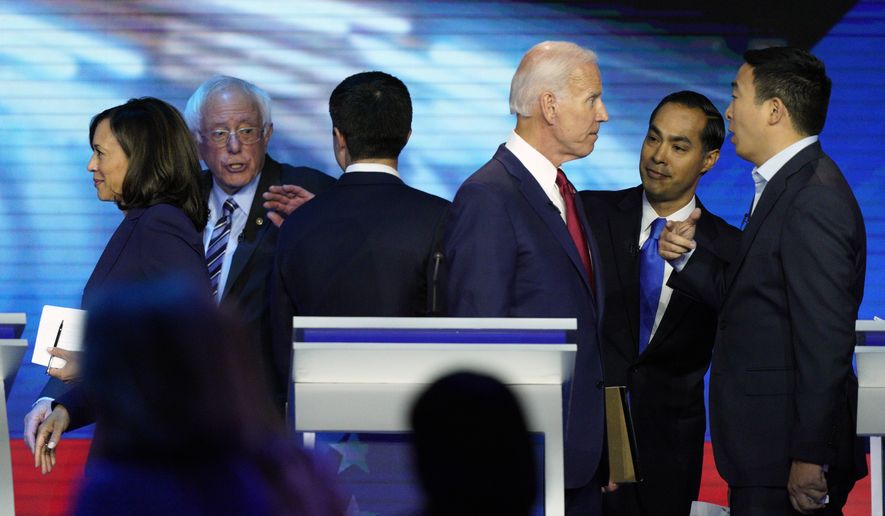OPINION:
By definition, what 14 million viewers watched on TV last Thursday night was not a debate — not even close.
Here’s how dictionary.com defines “debate”: “A discussion, as of a public question in an assembly, involving opposing viewpoints … a formal contest in which the affirmative and negative sides of a proposition are advocated by opposing speakers.”
The goal in a real debate is to arrive at a conclusion which best solves a problem. This is what is so frustrating about these badly constructed cattle calls; either no one proposes a workable solution to a real problem or the problem is ignored altogether.
Just one of many examples: In the third Democratic debate, none of the candidates mentioned the economy. Is the reason because the economy under President Trump appears to be doing so well? No one mentioned helping minorities find jobs, a standard line used by Democrats for decades, since black unemployment is at an all-time low.
All of the candidates are “pro-choice,” but those posing the questions asked nothing about the moral erosion of the nation, of which abortion is only a symptom. Is there anything these candidates would oppose when it comes to taking human life? Some extremists advocate for after-birth abortion, if a child is deemed “defective.” Some also think the elderly who have terminal illnesses should be allowed or even helped to die (assisted suicide has recently been made legal in a number of states). Who would decide when a life no longer has value? Based on what standard? Would that standard be constant or would it shift with the prevailing winds of the age?
During the 1858 Illinois Senate campaign in the classic seven debates between Democratic Sen. Stephen Douglas and Republican challenger Abraham Lincoln, someone introduced the two and then left the stage, allowing the men to take the time they wanted to stake out their positions and question each other. The debates went on for hours. People brought blankets and picnic baskets, sometimes making a day of it. Such a format would not work in the TV age, which has conditioned us to rehearsed sound bites, often lacking in substance.
Perhaps what we need is an example found in show business, because much of our politics, like news and so much else, resembles performance art.
Recall a British program that was tried in America, but didn’t last. It was called “The Weakest Link.” The set resembled what we see during these political shows. Multiple contestants stand behind a tall desk and are asked questions by the host. Each contestant then votes against the one they believe is the weakest link. The person with the most negative votes is dismissed until only one remains.
Joe Biden again contradicted several of his previously held positions. No one suggested anything that would reduce our crushing debt, a subject only Rep. Mark Sanford, South Carolina Republican, is addressing in his likely futile bid to challenge President Trump for the Republican nomination. Most of the Democrats advocate programs that would substantially deepen the debt.
The decidedly and unapologetically anti-Trump CNN is worried about the Democratic field. Following the Thursday night Houston event, one of its political analysts, Alice Stewart said: “As of now, there is no clear candidate who has demonstrated they have what it takes to take on President Trump.” Even with the “as of now” qualifier, it’s a pretty bold statement.
CNN commentator David Gergen, who has worked for presidents of both parties, was even bolder. About the Democratic field, Mr. Gergen said: “They are kidding themselves if they think any of the candidates is yet ready to slug it out with Trump. Just for starters, it is still devilishly difficult to know how much their promises will cost and how they will be paid for by just taxing the rich. If they wait much longer to define their budget plans, they will find Republicans defining them for them — and it won’t be pleasant.”
President Trump’s policies are being tested and with the exception of debt reduction appear to be working. About that there should be no debate.
• Cal Thomas, a nationally syndicated columnist, is the author of “America’s Expiration Date: The Fall of Empires, Superpowers and the United States” (HarperCollins/Zondervan, January 2020).




Please read our comment policy before commenting.